The EpiPen kid
When he found out he wasn’t allergic, this 25-year-old went headlong into the bee business
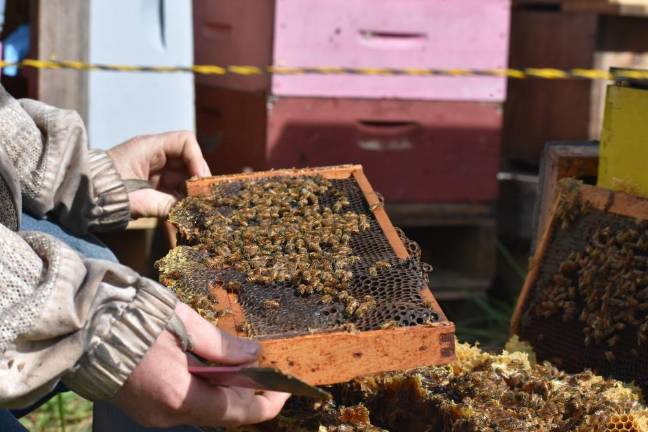
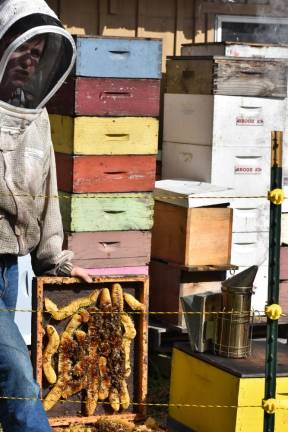
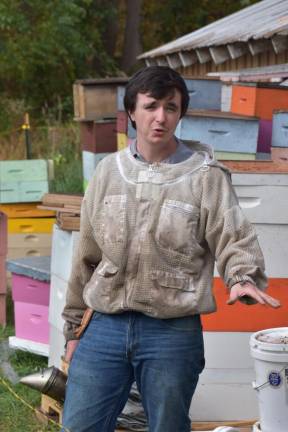
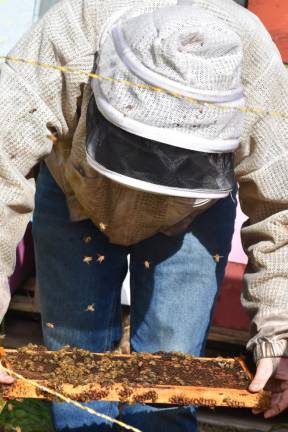
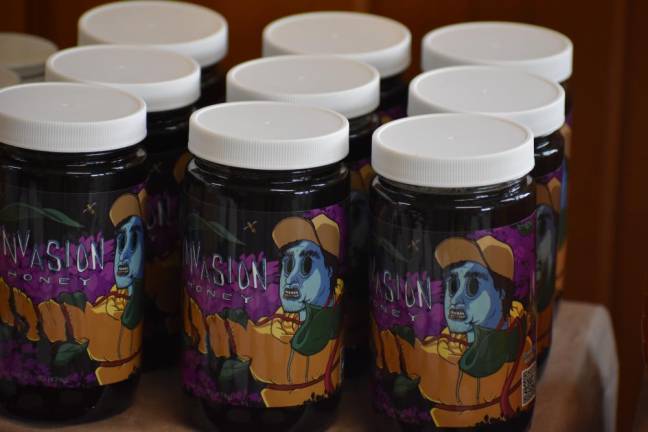
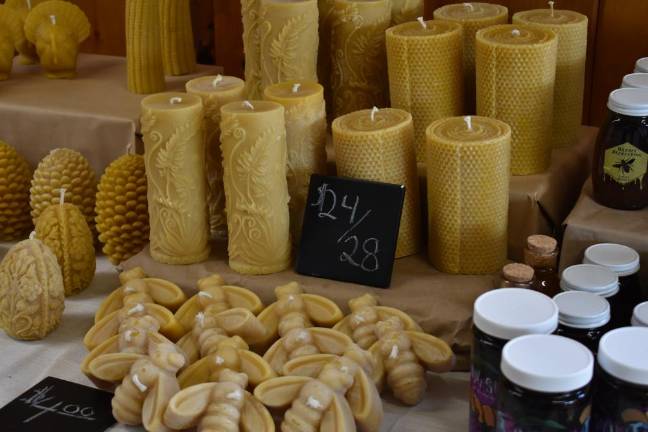
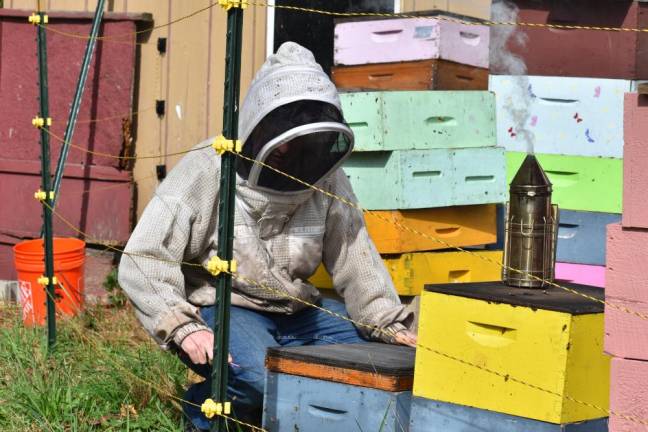
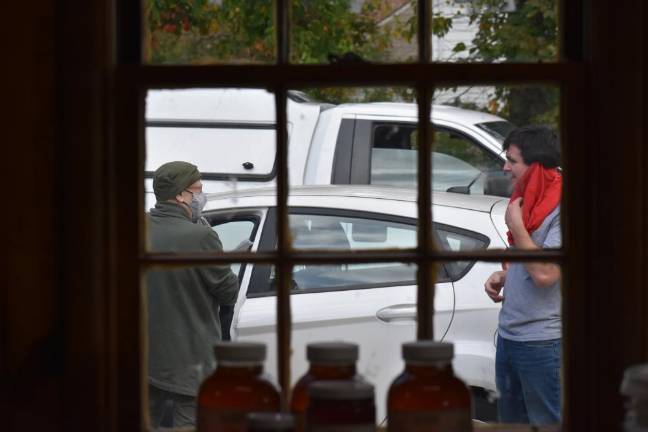
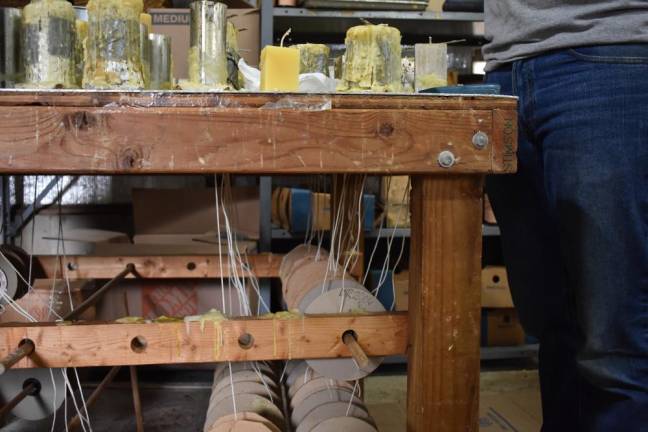
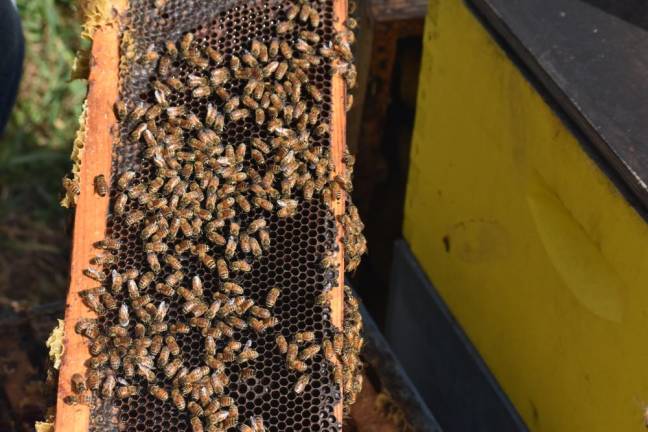
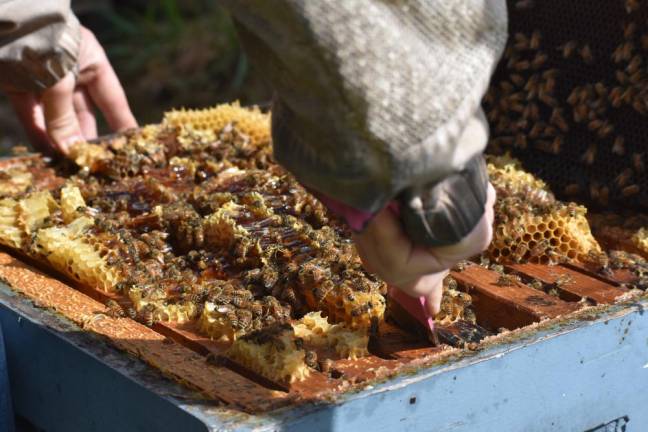
Eleven-year-old Patrick Harrison was the EpiPen kid. After a bee sting at Cub Scout camp blew him up like “the Michelin man,” his mom, a nurse, walked his friends through what to do if they found him unresponsive.
It wasn’t until freshman year of college that Harrison ended up at an allergist for an unrelated reason. While he was there, “they shot me up for all the bee venoms that are in the Northeast,” he said. “And they said, ‘Well you’re not allergic.’”
At 25, thanks to that allergist visit, his career has taken a turn his childhood friends would never have predicted. He’s the founder of a four-year-old “concierge” beekeeping service – clients pay him to set up and care for beehives on their property – and has just put up his shingle on a “brand spankin’” new store in Sussex County, NJ, where he’s selling bee products like candles, honey and eventually, beekeeping equipment.
Harbee Beekeeping is a 600-square-foot storefront, brown with forest green shutters, whose past tenants include a chimney company and an ill-fated petting zoo. It looks like a diminutive pole barn standing alone on a stretch of highway in the no-man’s land between Andover and Newton.
“It’s cute,” I offer.
“It’s awesome,” Harrison rejoins. “So, I’m in love with it.” He’s renting to buy, and hopes to secure a grant for young farmers and close on the property in 2022. He picked the area because bees make more honey up here than they do where he lives, thanks to variations in the soil and flora. “Same bees, same health in Andover can make 100 pounds of honey, versus in Bergen County can make 50 pounds of honey,” he said.
The property includes a garage, crucially, where Harrison and his part-time employee – a hobby beekeeper – have been pouring beeswax candles: pillars, votives and molded candles in the shape of bees, bears and turkeys. Once they’ve fixed the garage up, putting up a wall where a tarp now hangs, they’ll pour honey in here, too.
Harrison has started bringing some of 200 hives here, to their new digs. They are stacked outside the barn, surrounded by electric fencing and painted in a riot of mismatch colors sourced from the Home Depot “oops” section. The lawn is purposely long – a first step to turning this acre-and-a-third into a pollinator oasis.
As for his childhood friends, said Harrison, “They get cracked up that I’m doing bees now. ‘You traumatized me when I was little!’”
On opening weekend, Harrison put on his bee suit and attempted to drum up traffic by waving and twirling his open flag like a baton. It was moderately effective. Maybe 20 customers stopped by that first weekend in mid-October. But more took notice and came back later to get a jump on their holiday shopping, seeking out, Harrison explains with his characteristic candor, “a generic gift, that the person would kind of want.”
Harrison had pushed to open the store fast – hours are Fridays through Sundays, for now – to cash in on the holiday rush. “I forced it,” he said. “The first day was like skeleton tables. But I was here.”
A bespectacled woman from Sparta, NJ, stopped into the store the day Dirt visited, the Friday of its second weekend in business. Harrison likes this part: talking bees with customers, selling honey. After browsing awhile, his first customer of the day left with two candles and a $40 jar of honey. “I think you’re probably the most local honey source,” she told Harrison, as he carried her bag to her car. “I’ve been following on Facebook. I’ll be back.”
It’s a bold move to go it alone as a tiny retailer in the age of Amazon, just a few years out of college. In the past, Harrison has always had another line of work in addition to his own bee gig: as a garbage man for the Byram Department of Public Works, and working for another beekeeper. No more. Now he’s all in.
“Honey bees are sexy right now, and people want to support local business,” he said. “So I’ve got those two things going for me.” He’s also got a tightknit nucleus of people who have his back in ways large and small, like the aunt who snapped up all 10 of his Thanksgiving-themed turkey candles.
Harrison is quick to note that plenty of people have cool ideas; his parents’ support was what allowed him to turn his hobby into an enterprise. He lives with them in Bergen County, and started his business out of their house. “I can’t be pouring honey in my kitchen anymore,” said Harrison, who harvests about 4,000 pounds of honey a year. “Mom’s sick of that.”
Between my first visit and my second a month later, his displays had filled out and the atmosphere had taken on a homey feel – a community effort, it turns out. The dried purple flowers embellishing the displays were repurposed from Harrison’s brother’s wedding. The understated bee fabric curtains were sewn by his grandmother. A set of shelves had been snagged secondhand by Harrison’s mom, who drove them up I-80 with her scarf around her head and Mustang top down, because they wouldn’t fit otherwise. “Do not buy anything,” his mom has admonished, and other than a few display tables and tablecloths, Harrison has taken that advice to heart.
The armoire in the corner was donated by a customer (who was probably also decluttering, notes Harrison, but it’s nice!). After Harrison put out a call on social media, a woman who works at a local jeweler came by with 200 gallons of overstock packaging peanuts to donate. “I’d love to live in a world where nobody had peanuts to give me,” he shrugs. But given that they exist, might as well put them to use. Packaging materials, even biodegradable ones, are the product of complex, energy intensive supply chains.
“Nothing’s 100% sustainable,” he said. “I still have an F-150, I’m still buying gas.”
For all its risks, business feels like the right path – maybe even the only one – for a guy like Harrison. He’s always hustled. As a high schooler who struggled with dyslexia, Harrison made pocket money mowing lawns and shoveling snow. These days, he’s a fan of podcasts like NPR’s How I Built This, Planet Money and The Indicator.
Harrison is an Eagle Scout, bird watcher and vegetarian, except for when his hunter buddy gives him New Jersey venison. He studied environmental science at Ramapo College before getting a degree in business at Bergen County Community College. What he wants to be, ultimately, is an environmental steward. Entrepreneurship – rather than government or the nonprofit sector – seems like his best route to that end. That became clear to Harrison after a couple internships, one as a park ranger and another as a farm volunteer coordinator. He liked working outdoors, but wasn’t cut out to deal with bureaucracy or “chasing money.”
He prefers to stay nimble. Exhibit A: Harrison points out the display of Invasion Honey, his newest offering. When knotweed – “a horrible invasive species” that’s also a rich source of nectar – flowers in late August, it’s almost the only thing in bloom in this area, other than a trickle of goldenrod. So in July, Harrison harvested the wildflower honey from his hives, to bottle and sell. Meanwhile, his bees went back to work making knotweed honey with a very different hue – dark red, like Guinness – and a higher price point.
Harrison called his cousin and said, “Those characters that you draw, I want you to make me into one of your characters. So boom, I got this drawn up in a week.” On closer examination of the label, I see the resemblance. That’s not just any blue zombie under attack by a killer vine, but a caricature of Harrison. “If this was government,” he said, “I’d have to ask for approval to get someone to draw this label.”
While we’re talking, a solitary honeybee floats above the full jars, hovering in a beam of sunlight slanting through the window. “That’s one of ‘em,” said Harrison, seeing my attention land on the insect, an unusual sight this time of year. “She’ll find her way out.”
It’s time. The warmest part of the day, when the bees will be at their most “polite.” Harrison and I suit up: me in a full head-to-ankle suit with veil and gloves, Harrison pulling on a jacket with a hooded veil, over his jeans and sneakers. He works barehanded. “I’m clumsy with gloves, and so as long as I’m smooth, they aren’t as agitated,” he explains. It’s an unseasonably balmy autumn day, probably one of the last days of the year the bees will be out and about. Today’s mission – in addition to getting a photo – is to make sure the hives are heavy enough for winter.
We’ve selected the day with an eye to the weather. On a beautiful, sunny day like this, not only will the bees be more active, you’re also less likely to “get lit up,” as Harrison puts it.
Though for his own sake, Harrison hardly cares if he gets stung anymore. In fact, it happens pretty much daily during bee season. It’s such a regular occurrence that his reaction to bee stings fades from a bit of swelling in the early spring to nothing more than a little dot by the fall.
Yellow jackets, however, are a different animal. Harrison was reminded of that when he got stung moving buckets around his new bee yard, and the yellow jacket venom plumped up his entire hand.
Duly warned, I swap my long zoom lens onto my camera and crouch outside the electric fencing while Harrison, carrying a lit smoker, works his bees. He puffs smoke around the entrance to each hive before gingerly prying it open. “It’s like playing loud music while you’re breaking in, so they’re not necessarily concerned,” he explained, “or maybe, less concerned with me.”
One hive feels a bit light. Each colony should have 60 pounds of honey going into the winter, Harrison explains, examining the frames of honey. He puts the hive back together and walks off, returning with a five-gallon bucket of clear liquid that he pours into a top feeder: corn syrup.
Even the corn syrup has a backstory. It came to Harrison after three totes of the stuff were crushed in some sort of accident: truck, forklift, who knows. “They didn’t want to dump it down the drain, so they called the beekeeper. Free corn syrup for me. I gave the guy $100 to bring it over to my bee yard. It’d just be a shame, some farmer grew that corn, then somebody processed that corn into syrup, it’d be a shame to go into the garbage,” he said. “That was exciting. There was somebody using their head with that.”
The hives look healthy, but Harrison is perpetually aware that anything could happen. Like the bear that just got into one of his bee yards, which had a compromised electric fence.
There are Varroa mites already putting stress on bees, and then there are worse ones on their way from Asia. “The hundred year plan of this business needs to think about that,” said Harrison. There’s the recent legislation from the New Jersey Department of Health that puts honey under the “cottage food” umbrella and restricts where it can be poured, which has Harrison in limbo for the moment while he figures it out. It’s not even worth contemplating what would happen if Patrick himself got sick, or put his back out. At 25, who thinks about things like that?
“They say diversify,” he said wryly. “I’ve got a lot of money invested in bees.”